'It Could Have Been Me': Black Lawyers Reflect on George Floyd's Death and What Comes Next
Black attorneys and legal industry leaders recounted their own experiences with racism and their hopes for the future.
June 03, 2020 at 10:55 AM
11 minute read
The original version of this story was published on The American Lawyer
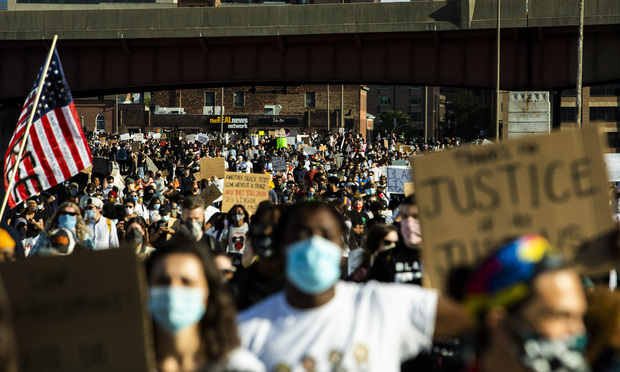 Thousands march in Baltimore on June 1 protesting police brutality and the killing of George Floyd in Minnesota at the hands of local police. Photo: Diego M. Radzinschi/ALM
Thousands march in Baltimore on June 1 protesting police brutality and the killing of George Floyd in Minnesota at the hands of local police. Photo: Diego M. Radzinschi/ALM
We asked seven black attorneys, including partners and law firm leaders across the United States, to recount their reactions to George Floyd's death and the days of protests that have followed. The lawyers spoke about their own experiences with racism, their experiences in the legal profession, their frustrations and the future.
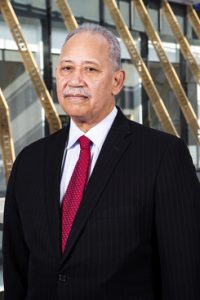 Benjamin Wilson. Courtesy photo
Benjamin Wilson. Courtesy photoWhen Ben Wilson saw the graphic video of George Floyd dying at the hands of the Minneapolis police, he was deeply pained not just for Floyd, but for black people who recently met similar fates: Breonna Taylor, whom the police shot dead in her Louisville home, New York's Eric Garner, whose cries of "I can't breathe" were echoed by Floyd and, now, demonstrators across the country.
Wilson, chairman of Washington, D.C., firm Beveridge & Diamond, said he also thought about black Americans whose names have been echoed by protesters and civil rights leaders for decades. Names such as Emmett Till, a 14-year-old boy lynched in Mississippi, and Jimmie Lee Jackson, a deacon and civil rights activist who was killed by the Alabama State Police.
Later, he remembered a quote from author William Faulkner: "The past is not dead. In fact, the past is not even past."
"To me, it's overwhelming; I thought about this as someone's son, someone's brother, and he's not going home tonight," Wilson said. "You fear for your children and grandchildren. We fear that this could have been our child, our brother. In the case of Breonna Taylor, our sister, or mother. It is a very heavy burden that I don't feel anybody can quite measure."
Floyd, a 46-year-old black man, died on May 25 after Minneapolis police officer Derek Chauvin held his knee on Floyd's neck for more than eight minutes while three other officers looked on.
The fear, Wilson said, comes not just from Floyd's death, but the promise of more violence toward black people and people of color. Wilson added that the protests—some violent, but the vast majority peaceful—are a byproduct of the repeated inability for governments and leaders to address systemic racism and the criminal justice system. Till and Jackson are reminders, he said.
"If there are not changes to our criminal justice system, he will have died in vain," Wilson said. "We must have change, not promises of change. We must have action; we must have it now. They [people] will not respect the rule of law, if they find it unjust, if they find it not to be fair."
No Words
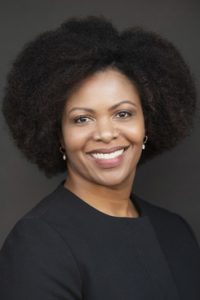 Angela Crawford. Courtesy photo.
Angela Crawford. Courtesy photo.Angela Crawford, co-founder of boutique firm Crawford & Acharya, found the videos of Floyd's death impossible to watch in their entirety.
"They are literally killing somebody while other people are watching and the people that are watching are powerless. And to see other officers not intervening and not stopping is unthinkable and unimaginable. There are no words that can accurately reflect how I felt and how I continue to feel about seeing something like that happen."
In the days since Floyd's death, Crawford, who lives in Miami, put together an email in hopes of transforming her anger and frustration into actionable questions that nonblack people and attorneys can ask themselves:
- Why do I assume the scores of black men and women who spoke about police brutality or other injustices in the criminal justice system "did something" to "deserve" that mistreatment?
- Why do I assume the African American person reporting employment discrimination is too sensitive, complaining, or just unqualified?
- Would I require a videotape before I believed anyone else's reports of violence or discrimination?
- What does the statement "Black Lives Matter" signify—why is it important to let that statement and its significance stand on its own?
Crawford also addressed the stubborn inequality of opportunity facing black people in America. In her own profession, black attorneys continue to be one of the least represented minority groups in the country. Despite accounting for 13% of the general population, black attorneys make up just 3.6% of Big Law ranks, according to ALM data, trailing Asian American and Hispanic numbers. Black partners account for 2.1% of the Am Law 200 partnership.
"Why am I not getting the same opportunities? I know how black people see and think. It is very similar to how my grandparents felt, my parents felt. How I feel. We've expressed that, so now I think other people need to do the hard work of challenging what they're thinking and feeling and doing something about it.
How do non-black people address racial issues in their circle and their family? On the golf course? How do they respond to comments and statements and stereotypes? The rooms that black people aren't in, those are the environment where people need to stand up and speak out and have the courage to speak out. Those backroom deals, the golf course, those are incredibly important for justice and equality."
It Could Have Been Me
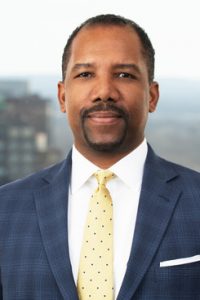 Robert Simpson. Courtesy photo
Robert Simpson. Courtesy photoSitting in his home office in Connecticut, Carlton Fields partner Robert Simpson had just gotten off a call with a religious nonprofit he founded, PRAYZE PARTY Inc., when he saw the video of Floyd's death.
He wept.
"The reality is that no matter what level of success you achieve, whether it's a partner of a firm, a justice of the U.S. Supreme Court, it doesn't matter. The treatment isn't fair and equal. It isn't our reality. When I looked at George Floyd pleading for his life, it carried the baggage I've carried with my entire life. It could have been me. It could have been my nephew; it could have been my cousin."
After watching the video, Prayze Party reconvened virtually over prayer and tears.
Looking for Lessons
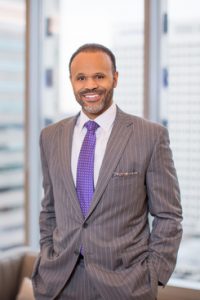 Jonathan Harmon. Courtesy photo.
Jonathan Harmon. Courtesy photo.McGuireWoods chairman Jon Harmon has put on several hats this week.
The first was that of a law firm chairman. As protesters across the country demanded justice for Floyd and his family, Harmon thought it essential for firm leadership to respond. He and firm managing partner J. Tracy Walker IV put together a video. Firm COO Richard Davis sent out the message firmwide.
"I said, 'we have to do a video so they can see us.' I really thought it was important that it be not just me. The video we put together was from me and our managing partner. The email sent to the whole firm was from our COO so that [our lawyers] knew that it came from everybody. This issue isn't a black issue, it isn't a white issue, it isn't male or female. This is our issue."
Harmon's other hat was that of a father to four black children. His eldest son, who is in college, first showed Harmon the video of Floyd's death. They looked to Harmon for answers: "What can we as individuals do?"; "Is this going to end?" At the dinner table, he told them a story from his own childhood.
"When I was my daughter's age, a cross was burned in the yard across the street. I spoke to them about how I learned from my parents. They taught me some very powerful lessons in the context of that aftermath. I learned from my parents that 'you don't hate. You never beat hate with more hate.' I later learned that he and my mother had a sense for who was responsible for it in the neighborhood. They never sought revenge. They even had who we believed was the perpetrator come to the house. If you allow the hate to get in you, you'll end up a lot worse."
Exhausted
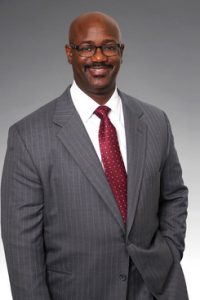 Jason Murray. Courtesy photo.
Jason Murray. Courtesy photo.Over the weekend, K&L Gates partner Jason Murray gave a sermon to his Opa-Locka, Florida, congregation:
"Sometimes, in our frustration, we speak to other people about our pain and somebody will say 'I'm mad too.' Your agenda may be one that's peaceful, the other person's agenda may not be. You have to be clear and sure that the people who you are connecting with you have the same agenda, that they're there for change."
Murray told Law.com that attorneys should be on the forefront of progress and amplify the voices of those who are marching for justice and of their communities. They should be volunteering to represent peaceful protesters and protecting their constitutional rights. He is a strident advocate for nonviolent protest. But he said he can understand the anger, the exhaustion from responding to violence with nonviolence.
"You're exhausted because you're constantly thinking about having to avoid descending to a baser nature or to 'give as good as I got.' I can't treat you how you treated me; I have to treat you how I want to be treated. We have to stay focused. Don't get distracted by people with wrong motives and wrong agendas. Don't let them hijack what you're doing. Don't let them silence you either."
An American Problem
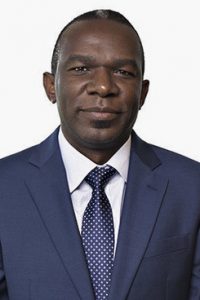 Sozi Tulante. Courtesy photo.
Sozi Tulante. Courtesy photo.What struck Dechert partner Sozi Tulante was Chauvin's "nonchalance" as his knee pressed into Floyd's neck.
"You have the officer who is kneeling on his neck for over eight minutes, and he has his hands in his pocket, and he looks like he's mowing the lawn. That's what's most disturbing."
The video made Tulante think of his experiences growing up. While he said he's had some positive interactions with the police, he remembers the negative ones as well: being stopped by police on Harvard's campus, having police mistakenly raid his house as a child. He cannot separate his lived experience as a black man in America and that of a lawyer; he brings his experiences with him to the office.
Black Americans are three times more likely to be killed by the police than white Americans, according to a database that tracks officer-involved shootings. Last year, police killed 1,099 Americans with nearly of quarter of those deaths being black Americans, despite black people accounting for 13% of the population.
Tulante said that the problem of police brutality and racial injustice can't be solved by black people alone.
"Racism isn't a black problem, it is an American problem. There's a real need for non-people of color to recognize their own privilege. None of my white prosecutor colleagues have walked into the courthouse and were mistaken for a defendant."
Finding Allies
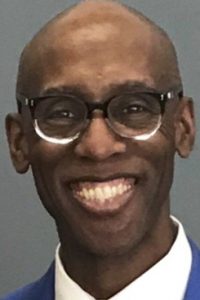 Christopher Taylor. Courtesy photo.
Christopher Taylor. Courtesy photo.New Jersey-based attorney Christopher Taylor, who has worked as a contract attorney at several firms in the past, has been heartened by the multicultural throngs of protesters across the country.
"There were white allies, Asian allies, Hispanic allies that joined in the fray. That put their bodies on the line. You're seeing it in a lot of these demonstrations. There are cross-cultural groups coming to the fore. And that we haven't seen in a long time."
He has also been surprised by the corporate response. Nike, Netflix, Disney, Intel, Facebook, Levi's and others have voiced support for Floyd's family and protesters. Many have pledged thousands if not millions to various causes. Whether those expressions of solidarity will be followed through with sustained change, Taylor said he doesn't know. But he feels that he must remain optimistic.
"I feel like I have to—for myself, and for my daughter. I believe most people are inherently good. I don't know the future but I do know this is putting America under a microscope. It's almost like Bloody Sunday. It brought America where it had to confront some of its issues. This is one of those situations where America has to seriously look at these issues."
This content has been archived. It is available through our partners, LexisNexis® and Bloomberg Law.
To view this content, please continue to their sites.
Not a Lexis Subscriber?
Subscribe Now
Not a Bloomberg Law Subscriber?
Subscribe Now
NOT FOR REPRINT
© 2025 ALM Global, LLC, All Rights Reserved. Request academic re-use from www.copyright.com. All other uses, submit a request to [email protected]. For more information visit Asset & Logo Licensing.
You Might Like
View All
MoFo Associate Sees a Familiar Face During Her First Appellate Argument: Justice Breyer

Amid the Tragedy of the L.A. Fires, a Lesson on the Value of Good Neighbors

Litigators of the Week: Shortly After Name Partner Kathleen Sullivan’s Retirement, Quinn Emanuel Scores Appellate Win for Vimeo
Law Firms Mentioned
Trending Stories
- 1Decision of the Day: Judge Dismisses Defamation Suit by New York Philharmonic Oboist Accused of Sexual Misconduct
- 2California Court Denies Apple's Motion to Strike Allegations in Gender Bias Class Action
- 3US DOJ Threatens to Prosecute Local Officials Who Don't Aid Immigration Enforcement
- 4Kirkland Is Entering a New Market. Will Its Rates Get a Warm Welcome?
- 5African Law Firm Investigated Over ‘AI-Generated’ Case References
Who Got The Work
J. Brugh Lower of Gibbons has entered an appearance for industrial equipment supplier Devco Corporation in a pending trademark infringement lawsuit. The suit, accusing the defendant of selling knock-off Graco products, was filed Dec. 18 in New Jersey District Court by Rivkin Radler on behalf of Graco Inc. and Graco Minnesota. The case, assigned to U.S. District Judge Zahid N. Quraishi, is 3:24-cv-11294, Graco Inc. et al v. Devco Corporation.
Who Got The Work
Rebecca Maller-Stein and Kent A. Yalowitz of Arnold & Porter Kaye Scholer have entered their appearances for Hanaco Venture Capital and its executives, Lior Prosor and David Frankel, in a pending securities lawsuit. The action, filed on Dec. 24 in New York Southern District Court by Zell, Aron & Co. on behalf of Goldeneye Advisors, accuses the defendants of negligently and fraudulently managing the plaintiff's $1 million investment. The case, assigned to U.S. District Judge Vernon S. Broderick, is 1:24-cv-09918, Goldeneye Advisors, LLC v. Hanaco Venture Capital, Ltd. et al.
Who Got The Work
Attorneys from A&O Shearman has stepped in as defense counsel for Toronto-Dominion Bank and other defendants in a pending securities class action. The suit, filed Dec. 11 in New York Southern District Court by Bleichmar Fonti & Auld, accuses the defendants of concealing the bank's 'pervasive' deficiencies in regards to its compliance with the Bank Secrecy Act and the quality of its anti-money laundering controls. The case, assigned to U.S. District Judge Arun Subramanian, is 1:24-cv-09445, Gonzalez v. The Toronto-Dominion Bank et al.
Who Got The Work
Crown Castle International, a Pennsylvania company providing shared communications infrastructure, has turned to Luke D. Wolf of Gordon Rees Scully Mansukhani to fend off a pending breach-of-contract lawsuit. The court action, filed Nov. 25 in Michigan Eastern District Court by Hooper Hathaway PC on behalf of The Town Residences LLC, accuses Crown Castle of failing to transfer approximately $30,000 in utility payments from T-Mobile in breach of a roof-top lease and assignment agreement. The case, assigned to U.S. District Judge Susan K. Declercq, is 2:24-cv-13131, The Town Residences LLC v. T-Mobile US, Inc. et al.
Who Got The Work
Wilfred P. Coronato and Daniel M. Schwartz of McCarter & English have stepped in as defense counsel to Electrolux Home Products Inc. in a pending product liability lawsuit. The court action, filed Nov. 26 in New York Eastern District Court by Poulos Lopiccolo PC and Nagel Rice LLP on behalf of David Stern, alleges that the defendant's refrigerators’ drawers and shelving repeatedly break and fall apart within months after purchase. The case, assigned to U.S. District Judge Joan M. Azrack, is 2:24-cv-08204, Stern v. Electrolux Home Products, Inc.
Featured Firms
Law Offices of Gary Martin Hays & Associates, P.C.
(470) 294-1674
Law Offices of Mark E. Salomone
(857) 444-6468
Smith & Hassler
(713) 739-1250







